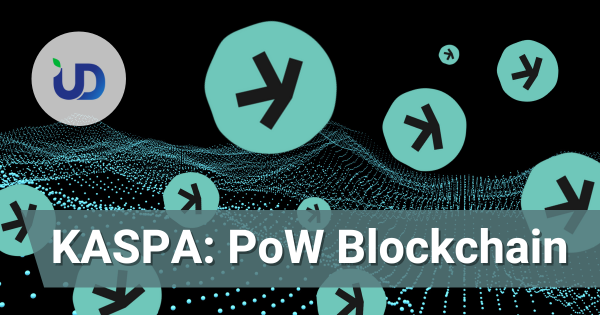Kaspa vs. Bitcoin: A New Era of Speed and Efficiency in Blockchain
Blockchain technology has come a long way since the inception of Bitcoin, and Kaspa is one of the latest innovations in this space. With a unique approach to Proof-of-Work (PoW) consensus, Kaspa aims to address some of the limitations of Bitcoin and pave the way for a more scalable and efficient blockchain. In this article, we'll explore what Kaspa is, how its PoW mechanism works, and how it differentiates from Bitcoin.
What is Kaspa?
Kaspa is a decentralized, open-source blockchain that utilizes the Proof-of-Work consensus mechanism. It was designed to improve upon Bitcoin's architecture by addressing issues related to scalability and transaction speed without compromising security and decentralization. Kaspa's innovative approach involves the use of a BlockDAG (Directed Acyclic Graph) structure, which allows for faster and more frequent block generation.
Understanding Proof-of-Work (PoW)
To fully appreciate Kaspa's advancements, it's essential to understand the basics of Proof-of-Work. PoW is a consensus algorithm used by many blockchains, including Bitcoin, to secure the network and validate transactions. In PoW, miners compete to solve complex mathematical problems, and the first to solve the problem gets to add a new block to the blockchain and receive a reward.
This process ensures that the network remains secure, as it requires significant computational power to tamper with the blockchain. However, PoW also has its drawbacks, including high energy consumption and slower transaction speeds as the network grows.
Kaspa's PoW Mechanism
Kaspa employs a modified version of PoW to overcome the challenges faced by traditional PoW blockchains like Bitcoin. Here are some key features of Kaspa's PoW mechanism:
BlockDAG Structure: Unlike Bitcoin's linear blockchain, Kaspa uses a BlockDAG structure. This allows for the creation of multiple blocks simultaneously, increasing the network's throughput and reducing transaction confirmation times. The BlockDAG structure enables Kaspa to handle a higher volume of transactions without compromising security.
Rapid Block Generation: Kaspa's network generates blocks more frequently than Bitcoin. While Bitcoin has a block time of approximately 10 minutes, Kaspa aims for a block time of just one second. This rapid block generation ensures that transactions are confirmed quickly, making Kaspa more suitable for real-time applications.
Greedy Heaviest Adaptive Subtree (GHAST) Protocol: Kaspa uses the GHAST protocol to achieve consensus within the BlockDAG. GHAST ensures that the heaviest and most connected subtrees within the BlockDAG are chosen as the main chain, providing security and consistency across the network.
Energy Efficiency: Although Kaspa still relies on PoW, its design aims to be more energy-efficient compared to Bitcoin. The frequent block generation and BlockDAG structure reduce the need for extensive computational power, making Kaspa a more environmentally friendly option.
How Kaspa Differs from Bitcoin
While Kaspa and Bitcoin both use PoW, there are several key differences that set Kaspa apart:
Scalability: Kaspa's BlockDAG structure allows it to handle a much higher volume of transactions compared to Bitcoin's linear blockchain. This makes Kaspa more scalable and capable of supporting a growing number of users and applications.
Transaction Speed: With a block time of just one second, Kaspa offers significantly faster transaction confirmations than Bitcoin. This makes Kaspa more suitable for applications that require real-time transactions, such as retail payments and decentralized finance (DeFi) platforms.
Security: While both Bitcoin and Kaspa offer strong security through PoW, Kaspa's GHAST protocol and BlockDAG structure provide additional layers of security and consistency. The network is designed to be resistant to common attacks, such as double-spending and selfish mining.
Energy Efficiency: Kaspa's approach to PoW is more energy-efficient than Bitcoin's. The reduced computational requirements and rapid block generation make Kaspa a greener alternative, addressing one of the major criticisms of traditional PoW blockchains.
Potential Use Cases for Kaspa
Kaspa's unique features make it suitable for a wide range of applications, including:
Real-Time Payments: The fast transaction speeds and low confirmation times make Kaspa ideal for real-time payment systems, providing a seamless experience for users and merchants.
Decentralized Finance (DeFi): Kaspa's scalability and security make it a strong candidate for DeFi platforms, which require high throughput and robust security to support complex financial products and services.
Supply Chain Management: Kaspa's efficient and secure network can be used to track and verify transactions in supply chains, ensuring transparency and reducing the risk of fraud.
Internet of Things (IoT): The rapid block generation and scalability of Kaspa make it suitable for IoT applications, where large volumes of data need to be processed and verified in real-time.
Conclusion
Kaspa represents a significant advancement in blockchain technology, offering a more scalable, efficient, and environmentally friendly alternative to traditional PoW blockchains like Bitcoin. By leveraging the BlockDAG structure and innovative consensus protocols, Kaspa is poised to address some of the most pressing challenges in the blockchain space. As the technology continues to evolve, Kaspa has the potential to play a crucial role in the future of decentralized applications and digital transactions.
UD is a leading blockchain and network security solution provider in Hong Kong
We are dedicated to assisting enterprises in advancing their businesses through innovative blockchain technology, ushering from Web 2.0 to Web 3.0
Take the lead and seize Web3 100x investment opportunities.
Learn about where to buy Web3 domain and what to buy with the UD team now.
What are Web3 Domains?
Unlike traditional domain names (like the ".com" you see at the end of most websites), Web3 domains are built on blockchain technology. Imagine… Continue Reading





